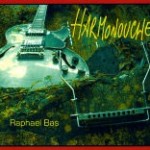“[The harmonica] has been widely used in blues and pop music but very little in jazz and swing,” notes Raphaël Bas in the liner notes to Harmonouche. He describes the record as “an attempt to give the harmonica… a greater recognition among other traditional instruments.”
Bas triples up harmonica and guitars (electric and acoustic). His nimble fretwork is the dominant sound here, whether in spirited solos or tight rhythmic strumming. He’s joined by clarinetist Chris Kohl, who’s no stranger to this music. As front man for the Hot Club of New Orleans, he’s well versed in the gypsy jazz idiom that dominates on Harmonouche. Jon Gross’s sousaphone makes an occasional appearance, lending that extra touch of New Orleans.
Harmonouche is ostensibly a harmonica showcase, but it’s the clarinet and guitar that steal the show. Take the impressive intro to Django Reinhardt’s “Belleville”, where Kohl plays in intricate parallel with Bas’ reverb-soaked electric. Acoustic guitar thumps along behind in typical gypsy-swing fashion.
Bas’ harmonica is most convincing on slow, ballad-type numbers, often alternating plaintive melodies with Kohl’s clarinet. On up-tempo, hard-swinging tracks, it feels limited, particularly when compared to the versatility and melodic range of its companions. But whatever it may do for the fortunes of the harmonica, the record stands on its own as an enjoyable bit of ensemble jazz from some fine New Orleans musicians.





